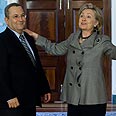
Clinton warns Iran, Syria on threats to Israel
US Secretary of state tells AJC Syrian transfers of weaponry to Hezbollah may lead to war, says Israel facing 'some of the toughest challenges in its history.' Barak: We'll hold Lebanese, Syrian governments responsible for introduction of 'balance-breaking' weapons to Hezbollah
The Obama administration Thursday warned Iran and Syria that America's commitment to Israel's security is unshakable, and they should understand the consequences of threats to the Jewish state.
In a speech, Secretary of State Hillary Rodham Clinton said Syrian transfers of increasingly sophisticated weaponry, including rockets, to militants in southern Lebanon and Gaza could spark new conflict in the Middle East. Additionally, she said a nuclear-armed Iran would profoundly destabilize the region.
"These threats to Israel's security are real, they are growing and they must be addressed," she said in the speech to the American Jewish Committee in Washington. The speech was the administration's latest effort to reassure Israel that its ties to the United States remain strong despite tensions that flared last month.
Clinton told the group that Israel is "confronting some of the toughest challenges in her history," particularly from Iran, Syria and groups they support like Hezbollah in Lebanon and Hamas in the Gaza Strip, and reaffirmed US determination to get them to change course.
"Transferring weapons to these terrorists, especially longer-range missiles, would pose a serious threat to the security of Israel," she said.
Israel has accused Syria of providing Hezbollah with Scud missiles, which would dramatically increase the group's ability to strike targets in Israel. Syria has denied the charges.
US officials have not confirmed Hezbollah's possession of Scuds but say they are concerned about its growing arsenal of rockets and missiles.
Israeli Defense Minister Ehud Barak, addressing the same group later, made the same points as Clinton and said Israel was watching closely the situation with Hezbollah and Iran. He said Israel would hold the Lebanese and Syrian governments responsible for the introduction of any "balance-breaking weapons" to Hezbollah.
Barak said Israel is not interested in escalation, but is following the effort to change the balance of power in the region.
Getting Syrian President Bashar al-Assad to stop supplying these weapons, Clinton said, is one of the administration's prime goals in returning an ambassador to Damascus. The United States has been without an ambassador in Syria for five years. The nominee, career diplomat Robert Ford, is awaiting Senate confirmation.
'US open to engaging with Tehran'
Some lawmakers have questioned the wisdom of sending an envoy to Syria now, saying it would reward the country for bad behavior.
Clinton argued it would not be "a reward or concession," but rather "a tool that can give us added leverage and insight and a greater ability to convey strong and unmistakably clear messages aimed at changing Syria's behavior."
"President Assad is making decisions that could mean war or peace for the region," she said. "We know he's hearing from Iran, Hezbollah and Hamas. It is crucial that he also hear directly from us, so that the potential consequences of his actions are clear."
On Iran, Clinton said the administration remains open to engaging with Tehran, but it must meet international demands to prove its suspect nuclear program is peaceful and not a cover for developing atomic weapons. Short of that, the United States will continue to press for tough new UN Security Council sanctions on Iran.
Iran is trying to forestall fresh sanctions and President Mahmoud Ahmadinejad may try to use a nuclear conference at the United Nations next week to lobby against them.
Ahmadinejad is now a confirmed speaker at the conference, which will review the Nuclear Nonproliferation Treaty at UN headquarters in New York, the UN confirmed Thursday night.
Ahead of her speech, Clinton said any attempt by Ahmadinejad to undermine the purpose of the conference would fail.
"If he believes that by coming he can somehow divert attention from this very important global effort or cause confusion that might possibly throw into doubt what Iran has been up to, ... then I don't believe he will have a particularly receptive audience," she said.
In her speech, Clinton also said the United States will continue to pursue an Israeli-Palestinian peace deal and is hoping to restart indirect talks between the two sides soon.
The administration's special Mideast envoy George Mitchell is due back in the region next week. His visit will follow a weekend meeting of Arab League diplomats at which US officials hope for an endorsement of the indirect talks, which Mitchell would mediate.
An attempt to get those talks started last month fizzled when Israel announced a new Jewish housing project in east Jerusalem, which the Palestinians claim as a future capital.
That drew fierce criticism from the United States and led to the worst rift between Washington and its top Mideast ally in decades.
Since then, the administration has sought to repair the damage with a series of recent meetings and speeches from senior officials, including Clinton and national security adviser James Jones.
Yitzhak Benhorin contributed to the report










